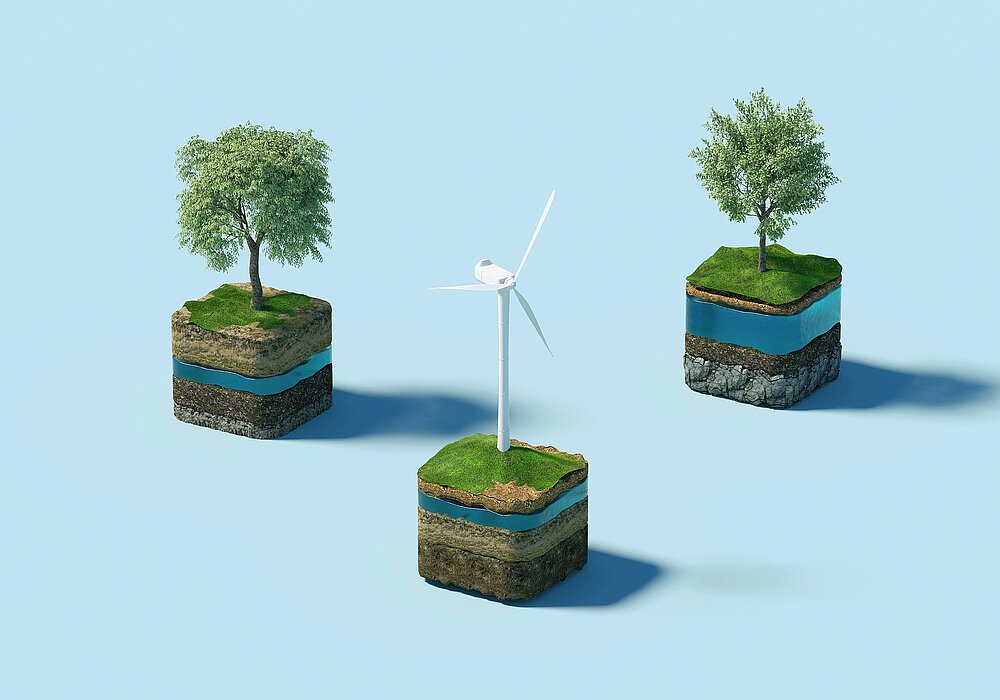Find out today what the legal world will be talking about tomorrow.

The topic of "sustainability" has also gained considerable importance in the context of procurement procedures in recent years. This applies to both - the construction sector and to the procurement of supplies and services. Sustainability is inherent in public procurement law: The public sector should procure according to the "best price-performance ratio" (Section 127 GWB). In addition to price or costs, qualitative, environmental or social aspects can also be taken into account.
In the upper and lower threshold range, there are various possibilities for public contracting authorities to impose sustainable requirements on procurement, Section 97 para. 3 GWB. The various possibilities can be classified into the so-called "three drawers". These correspond to the object of procurement (1), the suitability of the contractors (2) and the economic efficiency criteria (3). We have developed the "three drawers" to structure procurements in a meaningful and economical way. This structure helps contracting authorities and bidders to comply with procurement law requirements and to submit good bids.
Performance description ("drawer 1")
Public contracting authorities can incorporate sustainability aspects into the subject matter of the contract via the performance specification. The contracting authority has a wide scope here, as it can define the requirements for the subject matter of the contract itself. Section 31 VgV and Section 7a EU para. 1 No. 2, Para. 6 No. 1 VOB/A elaborate on the requirements of Section 121 GWB and in particular also contain requirements relating to the admissibility of specifications or minimum conditions which relate to sustainability.
Section 31 VgV determines the manner in which the service to be procured can be described. Pursuant to Section 31 para. 3 VgV, the subject matter of the service can be described with characteristics relating to aspects of quality, innovation and social and environmental aspects.
The selection of characteristics may relate to the entire life cycle (including the production and supply chain), even if such characteristics are not a material component of the performance, Section 31 para. 3 cl. 2 VgV. The characteristics must be related to the subject matter of the contract. In addition, the features must be proportionate to its value and to the procurement objectives. Accordingly, the contracting authority may set the following performance parameters (depending on the subject matter of the contract), among others (cf. in detail: Jasper, Nachhaltige Vergaben, 2nd part, p. 134, marginal no. 458.):
- Environmentally friendly manufacturing process,
- Recyclability of the product,
- Specifications with regard to a specific material,
- Energy generation from renewable energy sources.
Suitability criteria ("drawer 2")
In addition, the contracting authority may take environmental and sustainability aspects into account when selecting the companies to be considered for the contract (suitability test). The suitability of the companies is assessed according to their expertise, reliability and performance. The contracting authority checks whether a company meets these requirements on the basis of the suitability criteria to be defined by it. Pursuant to Section 122 para. 2 GWB, these suitability criteria may only include the following
- Qualification and permission to exercise the profession,
- economic and financial capacity,
- technical and professional capability
concern.
Pursuant to Section 46 para. 3 No. 7 VgV or Section 6a EU No. 3 lit. f VOB/A, the contracting authority may require, among other things, the specification of environmental management measures which the contractor can apply during the execution of the contract. Also, according to Section 6a EU No. 3 lit. d VOB/A or Section 46 para. 3 No. 4 VgV, the contracting authority may request information on the supply chain management and monitoring system which is available to the company for the performance of the contract.
Award criteria ("drawer 3", economic efficiency)
Contracting authorities can also take sustainability criteria into account at the award level (e.g. also ECJ, Rt. v. 17.09.2002 - Case C-513/99 - Concordia Bus Finland). In this context, contracting authorities can set up so-called environmental protection criteria within the framework of "quality". Here, too, the contracting authority has wide-ranging scope.
Pursuant to Section 127 para. 1 cl. 4 GWB, qualitative, environmental or social aspects may be taken into account in addition to price or costs in order to determine the most economically advantageous bid. The prerequisite is that the award criteria are related to the subject matter of the contract, Section 127 para. 3 cl. 1 GWB. The evaluation criteria applied must also be "objectively comprehensible" and verifiable.
Sustainability aspects can be taken into account at the award level as follows, among others:
- Environmental compatibility of material production (cf. also VK Bund, B. v. 30.04.2002 - VK 2.10/92),
- life cycle costs,
- procurement and production from fair trade.
In addition, energy efficiency as an award criterion pursuant to Section 67 para. 5 VgV must be given appropriate consideration in the procurement of supplies and services relevant to energy consumption.
Authors



